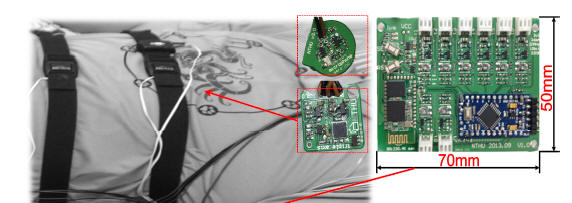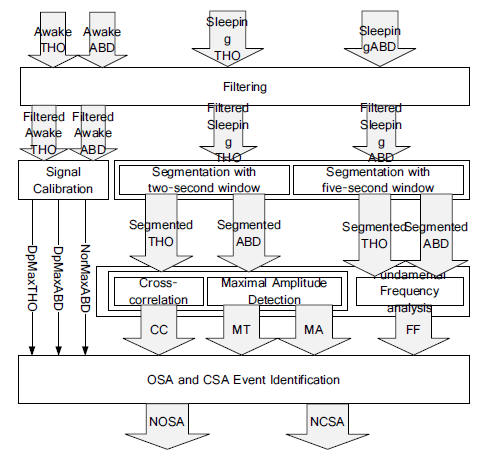Sleep Apnea Syndrome Signal Processing and Artificial Intelligence Homecare System:
Sleep apnea syndrome (SAS, 睡眠呼吸中止症) is a popular but easily-ignored disease for modern people. Traditional polysomnography (PSG) examination is labor-intensive SAS diagnosis method and the wearing devices of the PSG are complicated and uncomfortable. This research project cooperates with Prof. Po-Chiun Huang and Prof. Hsi-Pin Ma of NTHU EE, Doctor Yu-Lun Lo of Linkou Chang Gung Memorial Hospital, and Prof. Hau-Tieng Wu of Duke University, USA. This research develops a wearable 3D accelerometer/SpO2/ECG device as IoT Sensors and designs sleep-apnea event detection/classification/analysis algorithms on the Cloud AI computing Server for Tele-homecare monitoring systems.
Research topics : Fused detection of sleep apnea by 3D acceleromenter and ECG signals, Sensor IoT and Cloud AI analysis for SAS homecar systems.


- Yin-Yan Lin, Hau-tieng Wu, Chi-An Hsu, Po-Chiun Huang, Yuan-Hao Huang, and Yu-Lun Lo, “Sleep Apnea Detection Based on Thoracic and Abdominal Movement Signals of Wearable Piezo-Electric Bands, “ IEEE Journal of Biomedical and Health Informatics, vol. 21, no. 6, pp.1533-1545, Dec. 2017.
- Hau-tieng Wu, Jhao-Chen Wu, Po-Chun Huang, Ting-Yu Lin, Tsai_Yu Wang, Yuan-Hao Huang, and Yu-Lun Lo, “Phenotype-Based and Self-Learning Inter-Individual Sleep Apnea Screening With a Level IV-Like Monitoring System,” Frontier Physiology, Computational Physiology and Medicine, https://doi.org/10.3389/fphys.2018.00723, 02 July, 2018.
- Hung-Chi Chang, Hau-Tieng Wu, Po-Chiun Huang, Hsi-Pin Ma, Yu-Lun Lo, and Yuan-Hao Huang, “Portable Sleep Apnea Syndrome Screening and Event Detection Using Long Short-Term Memory Recurrent Neural Network“, Sensors, Vol. 20, no. 21, http://doi/org/10.3390/s20216067, 25 Oct. 2020.